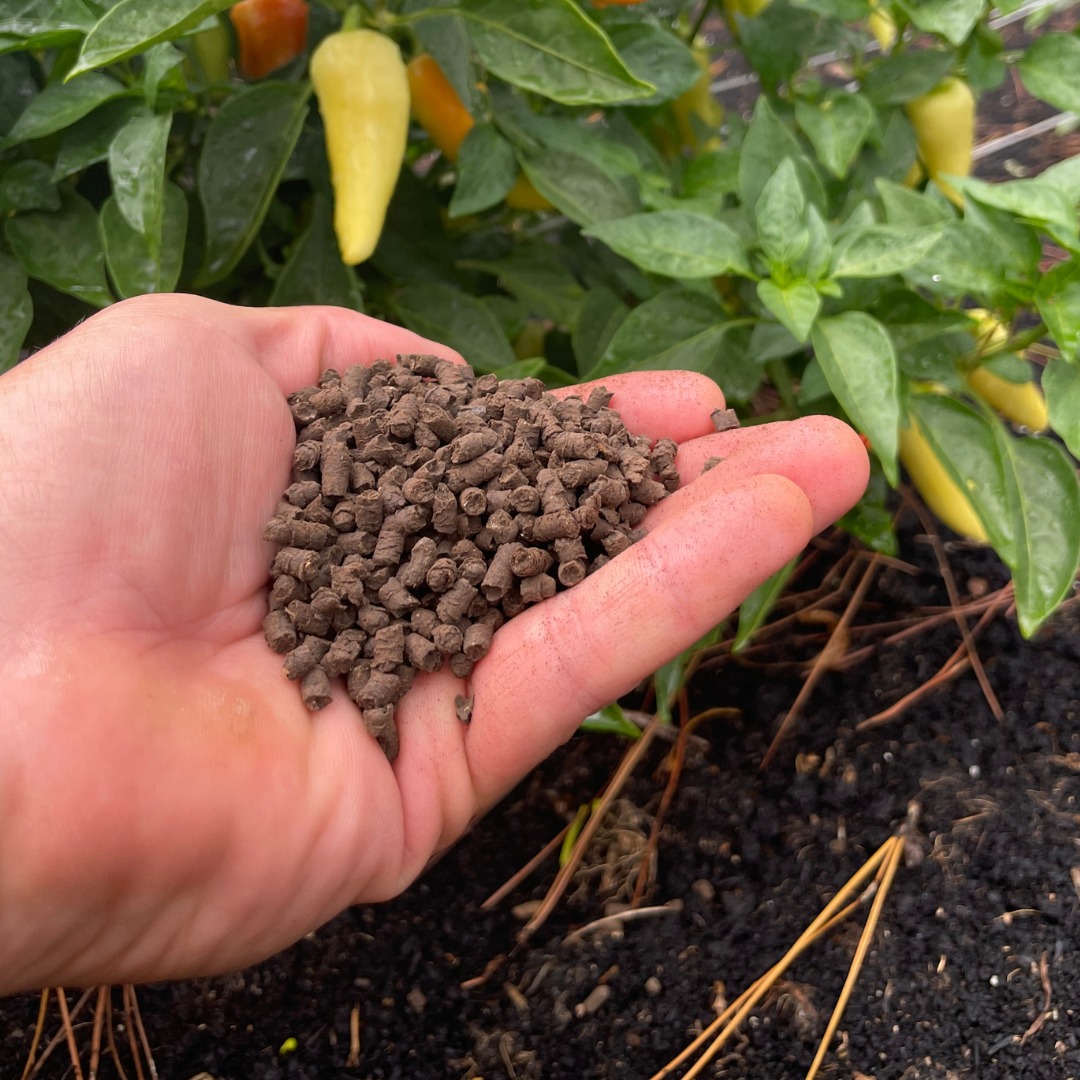Are organic fertilizers the best thing to use for your backyard garden? Or is it okay to use some synthetic fertilizers on occasion when plants are struggling? Many gardeners are confused by the overload of information about organic versus synthetic fertilizers, so I wanted to use this blog as an opportunity to discuss our experiences.
Using Synthetic Fertilizers in the Beginning
When we first moved to our property in 2013, we began transforming a landscape covered in pine trees into a thriving backyard garden. This process wasn't glamorous or easy, but we did it. We started with two plots and now have 8 plots that are all approximately 1,000 sq. ft. each.
In our first few years of gardening on this land, we used only synthetic fertilizers. Our native soils here are really sandy and don't hold nutrients or organic matter very well. Those pine trees had sucked all the nutrients from the soil, so there wasn't much there for us to utilize.
Building healthy, more sustainable soils was a goal, but it wasn't going to happen overnight. We knew that if we wanted to get at least some production from our backyard garden, we'd have to use synthetic fertilizers in the beginning. But this came with some consequences.
Why We Made the Shift to Organics
We had some bountiful gardening seasons using only synthetic fertilizers, but we started to notice something after a few years. After growing a heavy feeder like sweet corn or onions with synthetic fertilizers, our plots would seem zapped and lifeless after the harvest. We started to think that all these synthetic inputs, although effective for the corn and onions, was not the best long-term solution for our soil.
We started to use some organic fertilizers as a pre-plant option where we'd add it to the planting furrow or incorporate it into the soil prior to planting. But we still relied on synthetic fertilizers to feed plants as they grew. We didn't feel confident enough to completely ditch the synthetic stuff.
But in 2021, we went completely organic with our fertilizer choices. It has definitely taken some adjustment and preparation, but three years later we feel great about our decision. Our soils have more sustained fertility and we don't get these random crop failures where the soil seems zapped and lifeless.
Organic vs. Synthetic Fertilizers
Now that you better understand our journey, I feel it's important to list some of the benefits and disadvantages of organic and synthetic fertilizers. Although we're strictly organic now, I've never been one to get on a pedestal and preach organic gardening practices. I believe everyone should make educated decisions based on the information they have and do what works best for their situation.

Synthetic Fertilizers
Synthetic or "chemical" fertilizers are sold in a form that is readily available to plants. This means that plants can quickly uptake the nutrients once applied to the soil. This is also why synthetic fertilizers will often give your plants a much faster "pop" of growth compared to organic fertilizers.
Synthetic fertilizers are also usually cheaper than organic fertilizers. You can sometimes find a big bag of 10-10-10 or Triple 13 at your local farm supply store for $25-30. But as we know with most things in life, cheaper isn't always better.
After using synthetic fertilizers for several years, I'm a firm believer that you don't always get all the nutrients in that guaranteed nutrient analysis. So even though that nitrogen number may seem appealing because it's high, your plants might not be getting all that you're putting into the soil.
The downside to these synthetic nutrient forms being so "available" is that they're also somewhat volatile in the soil. This means that they don't stay there that long and can be subject to loss via runoff during heavy rains. So although you may think you're applying 10% nitrogen, your plants may only be getting half of that.
Synthetic fertilizers can also cause some accumulations that will damage soils over time. They can more greatly affect the pH of your soil when used in excess, and they can also create salt accumulations. When used sparingly they can be very effective, but they can also be harmful to soils when used heavily and exclusively.
Organic Fertilizers
Organic fertilizers are slower to work because they are made of large carbon molecules. These molecules are too large to be absorbed by plant cells, so they must be broken into smaller forms. This is usually done by the microorganisms and other biology in your soil.
Organic fertilizers are also usually more expensive than synthetic fertilizers. You might pay twice as much for the same volume of a 5-4-3 organic fertilizer compared to a 10-10-10 synthetic fertilizer. But as mentioned above, you've got a higher chance of losing some of that when using synthetics.
Using organic fertilizers is a long-term play. It's not going to fix anything immediately. This means using them takes a bit of preparation. You have to plan ahead because you can't always rely on organics as a "rescue fertilizer."
This is why we always like to add Coop Gro to the furrow when we're planting just about anything. It provides a great slow-release nutrient source for young transplants or seeds that have recently germinated. It also helps maintain an adequate level of soil nutrition over the long term. As a result, our plots never get "zapped" or depleted even though we're growing in them year round.
How Do You Make the Switch?
If you're looking to transition from synthetic to organic fertilizers for your backyard garden, I would recommend making the transition slowly. Start using an organic fertilizer at pre-plant, either in the planting furrow or gently incorporated into the entire bed. Keep some synthetic fertilizer on hand in case the plants need an extra jolt as they grow.
Over time you'll start to build more healthy and diverse soil and will rely on synthetic fertilizers less each season. You'll also begin to understand how much organics your soil will need to grow a bountiful harvest. I don't like making one-size-fits-all fertilizer quantity recommendations because everyone's garden and soil is different. The best thing you can do is keep growing and keep learning!

